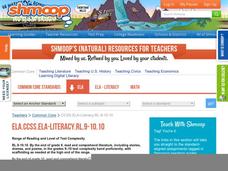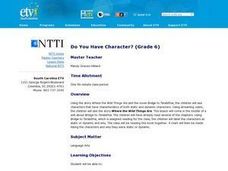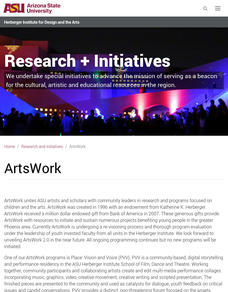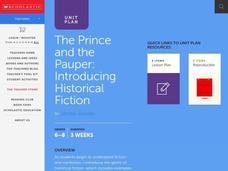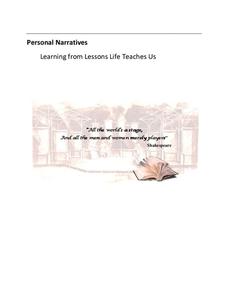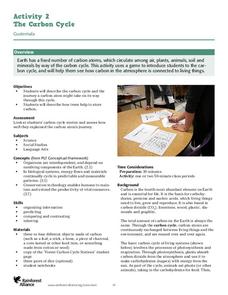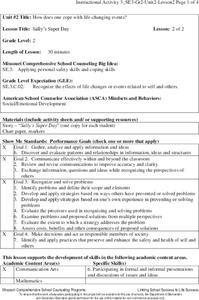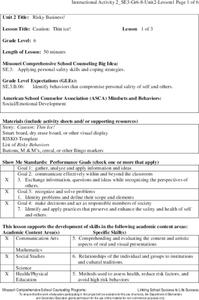Curated OER
Character Bust: Ceramics Lesson
Whether it is a protagonist, antagonist, hero or heroine, characters are a must in any story. Learners analyze a character from a narrative they are reading, then use that character as inspiration. They create a ceramic bust depicting...
Curated OER
Through the Eyes of the Big Bad Wolf
Imagine how the wolf would tell the tale of Little Red Riding Hood or The Three Little Pigs. Young writers re-imagine classic tales by adopting the point of view of another character in the story. After reading models like The True Story...
Curated OER
Documenting the Great Depression
Students compare and contrast two photographs from the Great Depression, and identify the ways in which the photographers depicted the hardships of everyday life during this period. They hypothesize about the story behind each photograph...
Shmoop
ELA.CCSS.ELA-Literacy.RL.9-10.10
How do you assess what your pupils have learned over the course of the year? Find out how competent they are at reading and analyzing age-level literature with the ideas presented here. Included in this resource are two suggested...
Curated OER
Because of Winn-Dixie Scrapbook
Here is a fun resource that your kids will love. While reading the book Because of Winn-Dixie, they analyze the story's main characters by creating an online scrapbook. The purpose is to have them identify character traits and use...
Hawaiʻi State Department of Education
Dance Critic
What do writing and dance have in common? They both have a six-trait rubric for assessment. Just like a good story, a good dance must have a hook, beginning, middle, end, logical sequence, and a climax. Learners use a...
Curated OER
"Three Shots": Ernest Hemingway's Nick Adams
Analyze characterization in literature. Readers use "Three Shots," from The Nick Adams Stories by Ernest Hemingway and complete classroom activities that require them to apply literary analysis techniques. They write their own short...
Annenberg Foundation
Gothic Undercurrents
Terror, mystery, excitement. American writers of the 19th century, including Nathaniel Hawthorne, Herman Melville, and Emily Dickinson, used these elements to create morally ambiguous tales that challenged the prevailing belief in...
Curated OER
Writing the Essay
Relate the structure of the essay to the structure of a building. The class compares an essay to a building, with the writer being the architect, the introduction being the foundation, and so on. They use the visual representation of a...
PBS
Myth of the West: Kit Carson to the Rescue
There's nothing like the Wild Wild West! Scholars investigate the American Frontier through the eyes of Kit Carson. To complete the first installment of a three-part series, they use presentations, a short video, and primary and...
Curated OER
Do You Have Character?
Sixth graders read Katherine Paterson's novel, Bridge to Terabithia, and watch a video of Maurice Sendak's book, Where the Wild Things Are. They examine the characters in both stories that share similar characteristics. Students use the...
National Endowment for the Humanities
Jacob Lawrence's Migration Series: Removing the Mask
Describe, analyze, compare and contrast poets from the Harlem Renaissance. Critical thinkers analyze the imagery, characterization, tone, symbolism, and historical context of Jacob Lawrence, Helene Johnson, and Paul Laurence Dunbar. A...
Maryland Department of Education
Our Children Can Soar
Amazing efforts of African American leaders are celebrated in a lesson on civil participation. The engaging resource focuses on primary and secondary sources to analyze the impact of African American leaders such as Ella Fitzgerald....
VH1
Lesson 4: Behind the Movie Chicago
The elements of music and journalistic integrity in one lesson; What could be better? The class discusses journalistic approaches to better understand responsible reporting versus sensationalism. They watch the Act One from the film...
Curated OER
Memoir
After reading and analyzing two narrative memoirs, middle schoolers engage in a variety of activities, including writing an essay, developing a story map, and creating character charts. They then compare and contrast story maps, and...
Curated OER
Yellow Bird and Me
Upper elementary artists create works which demonstrate an understanding of the many elements of theater and the visual arts. This four-day plan combines many wonderful aspects of visual, musical, and theatrical arts into one very...
Curated OER
The Prince and the Pauper
Mark Twain, the famous American author, is often studied in the school system. Use "The Prince and the Pauper" to analyze the differences between the text and its video version. This lesson includes several culminating project...
National Museum of the American Indian
Fritz Scholder: A Study Guide
In this engaging activity involving close analysis of abstract expressionist art, your class members will not only discover more about artist Friz Scholder's Native American art, but they will also have the opportunity to consider...
Thoughtful Education Press
Personal Narratives: Learning from Lessons Life Teaches Us
"First Appearance," Mark Twain's tale about overcoming stage fright, serves as a model of a personal narrative and gets young writers thinking about milestones in their own lives. After examining student models and considering the...
Curated OER
Folktale Writing
Review literary analysis techniques with this reading lesson about folktale writing. Middle schoolers read different folktales from many authors, and write their own folktales to share with the class. They identify the plot, morals and...
Curated OER
Lesson Mystery: The Game is Afoot
Students enter and experience the world of Sherlock Holmes and hard-boiled detectives in this unit on mysteries. They review and analyze the ""Whodunit Requirements" and the "Mystery Contract" that accompany this lesson. Each student...
Rainforest Alliance
The Carbon Cycle
Scholars learn about the carbon cycle, play a carbon cycle game, and then write a story based on their role as a carbon atom during the game. After the writings, pupils analyze the carbon cycle by leading a class discussion on the material.
Missouri Department of Elementary
Sally’s Super Day
After having a bad day, Sally took scholars' suggestions and had a super day. Pupils listen to her newest short story then discuss the events that occurred. They sort each event by what was in her control and what was not. Participants...
Missouri Department of Elementary
Caution: Thin Ice!
Sixth graders listen to a story titled "Thin Ice!" then partake in a whole-class discussion asking and answering questions about what was read. Scholars brainstorm risky behaviors in preparation for a game of RISKO—a game similar to...





